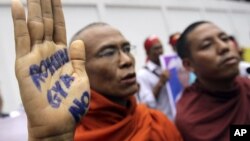A U.N. human rights expert has traveled to several Burmese towns in the country's west where deadly riots erupted between Buddhists and Rohingya Muslims last month.
A local monk said about 100 Buddhists staged a peaceful protest in the town of Maungdaw as Tomas Ojea Quintana visited Burma's Rakhine state, near the border with Bangladesh.
U Arsi Ra said the protesters held signs urging the U.N. refugee agency UNHCR not to discriminate between Buddhists and Muslims when providing aid to tens of thousands people who fled their homes due to the riots.
"Arriving by air, Quintana met with local officials at a Maungdaw administrative office. Then, he went to see temporary refugee shelters including a high school and a monastery. Quintana leaves for Buthidaung [another border town with Bangladesh] later today. [In Maungdaw,] he is facing a protest by Buddhists who accuse the United Nations of favoring Muslims," said the monk, U Arsi Ra.
Some Rakhine Buddhists perceive the UNHCR as having a pro-Muslim bias because the U.N. agency recruited most of its Rakhine personnel from Muslim communities.
Burmese authorities have detained several UNHCR staff on suspicion of instigating the Buddhist-Muslim riots that killed more than 70 people.
In Tuesday's protest, Buddhist activists in Maungdaw also called for justice for all victims of the violence.
Foreign rights activists have accused Burmese security forces of committing abuses against Rohingyas and other minority Muslims in response to the riots. Burma has rejected the accusation and insisted that its forces exercised "maximum restraint."
Burma's government refuses to recognize the country's estimated 800,000 Rohingyas as an ethnic group and many Burmese consider them to be illegal immigrants from Bangladesh.
VOA Burmese Service's Moe Zaw contributed to this report.
A local monk said about 100 Buddhists staged a peaceful protest in the town of Maungdaw as Tomas Ojea Quintana visited Burma's Rakhine state, near the border with Bangladesh.
U Arsi Ra said the protesters held signs urging the U.N. refugee agency UNHCR not to discriminate between Buddhists and Muslims when providing aid to tens of thousands people who fled their homes due to the riots.
"Arriving by air, Quintana met with local officials at a Maungdaw administrative office. Then, he went to see temporary refugee shelters including a high school and a monastery. Quintana leaves for Buthidaung [another border town with Bangladesh] later today. [In Maungdaw,] he is facing a protest by Buddhists who accuse the United Nations of favoring Muslims," said the monk, U Arsi Ra.
Some Rakhine Buddhists perceive the UNHCR as having a pro-Muslim bias because the U.N. agency recruited most of its Rakhine personnel from Muslim communities.
Burmese authorities have detained several UNHCR staff on suspicion of instigating the Buddhist-Muslim riots that killed more than 70 people.
In Tuesday's protest, Buddhist activists in Maungdaw also called for justice for all victims of the violence.
Foreign rights activists have accused Burmese security forces of committing abuses against Rohingyas and other minority Muslims in response to the riots. Burma has rejected the accusation and insisted that its forces exercised "maximum restraint."
Burma's government refuses to recognize the country's estimated 800,000 Rohingyas as an ethnic group and many Burmese consider them to be illegal immigrants from Bangladesh.
VOA Burmese Service's Moe Zaw contributed to this report.




